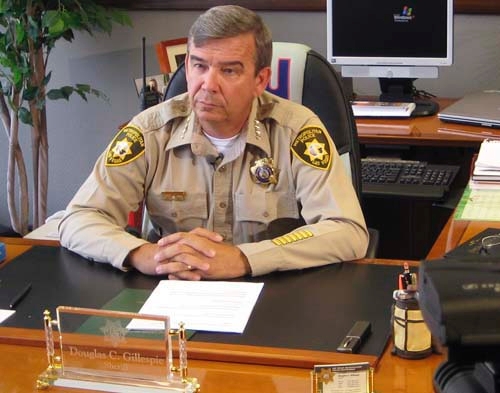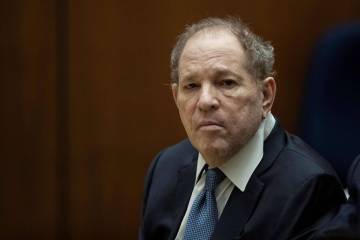Commissioners eye police’s budget reserves
As the Southern Nevada economy dipped into never-before-seen depths, Sheriff Doug Gillespie prepared for the worst.
In recent years he cut hundreds of positions, negotiated union pay concessions and sliced operational costs to the bone, all of which helped the Metropolitan Police Department amass $84 million in budget reserves.
Those reserves, Gillespie said, were meant to tide over his agency until the economy and tax revenues rebound.
But on Tuesday, the Clark County Commission set its sights on the reserve fund of the Police Department and the county subsidies to the Southern Nevada Health District as a way to ease its own budget woes.
The Police Department's next budget of $501 million already uses $33 million in reserves, leaving $51 million, about 10 percent of its operating budget.
"(That) sounds like a lot of money," Gillespie told the commission. But "it will be gone in a very short period of time."
Commissioner Chris Giunchigliani suggested cutting the reserves in half, to 5 percent of the budget, and giving the other
$26 million to Las Vegas and the county, which together fund about 70 percent of the police budget.
"The reserve should be with the county and the city, not necessarily Metro," she said.
Commissioner Steve Sisolak agreed, noting the county's own dwindling budget reserves.
"It's difficult for Metro to carry a reserve that's potentially larger than what the county can carry," he said.
He praised the sheriff for his fiscal responsibility, then added "maybe to your detriment."
In the past three budget years, Gillespie cut his agency's budget from
$549 million to $501 million. Much of the savings came from keeping positions vacant, eliminating 435 positions, including 238 police officer slots, and securing pay and benefit concessions from the agency's three employee unions.
A year ago, the Police Department used budget reserves to help cover a $36 million drop in property tax revenues while trimming city and county contributions by at least 5 percent.
Gillespie told the commission that "it would be a mistake" to dip into those reserves now, especially because the money probably will be needed to maintain police services in coming years.
Giunchigliani reassured the sheriff that the city and county could step in if his agency needs more than a 5 percent reserve.
"We're your guarantor, so if something happened, it's still the city's obligation and the county's obligation to bail you out," she said.
Sisolak likened the move to Gov. Brian Sandoval's proposed budget, which would cost the county $125 million a year by shifting program costs to local governments and diverting some local property taxes to the state.
"What we complained about the state doing to us, we're turning around and doing to Metro," Sisolak said.
Commissioners Larry Brown and Tom Collins sided with the sheriff.
Brown likened the move to "robbing Peter to pay Paul" and said he wouldn't support something that jeopardized the fight against crime.
Collins said the county should be rewarding Gillespie's superior efforts to save money rather than taking his agency's reserves.
The commission directed county staffers to look further into the idea.
The police department's Fiscal Affairs Committee, which includes City Councilmen Gary Reese and Steve Wolfson and Commissioners Brown and Sisolak, meets Monday to approve the final budget.
Leaders of the police employee unions expressed disappointment in the county proposal.
"We made sacrifices at all levels of this organization to build that fund balance. I have full faith that the sheriff will protect that," said Capt. Leroy Kirkegard, vice chairman of the Police Managers and Supervisors Association, which represents about 450 sergeants, lieutenants and captains.
Chris Collins, executive director of the Police Protective Association, which represents about 2,800 rank-and-file officers, was more pointed, saying the city and county knew the sheriff's intentions as he built the reserves.
"The sheriff certainly did not accrue an $84 million fund balance overnight," he said. "For them to come in at the 12th hour and say, 'We're going to fix our budget problem with your money,' I don't think that helps anybody."
Reserve fund raiding would create more frustration for the employees who sacrificed pay and benefits to help secure their agency's financial security in coming years, Collins said.
"At what point do police say, 'To heck with it. If you want to lay us off, lay us off,' " he said. "And when the crime numbers go back up, don't blame the police."
Commissioners also are leaning toward taking the county's subsidy from the health district. Last year, the district received more than $18 million in county money.
The money helps pay for labor costs, the laboratory, environmental health, nursing, chronic disease prevention and other programs, said Jennifer Sizemore, district spokeswoman.
The 450-employee district could manage for a while without the money but could run into funding problems later if the property tax revenue on which it relies keeps falling, Sizemore said.
"We're being penalized for being able to plan ahead," Sizemore said.
But Sisolak said the district has been flush because of the county's subsidy.
The money has enabled the district's employees, including managers, to get raises while other public workers are taking pay cuts, he said.
Las Vegas Review-Journal reporter Scott Wyland contributed to this report. Contact reporter Brian Haynes at bhaynes@reviewjournal.com or 702-383-0281.




























